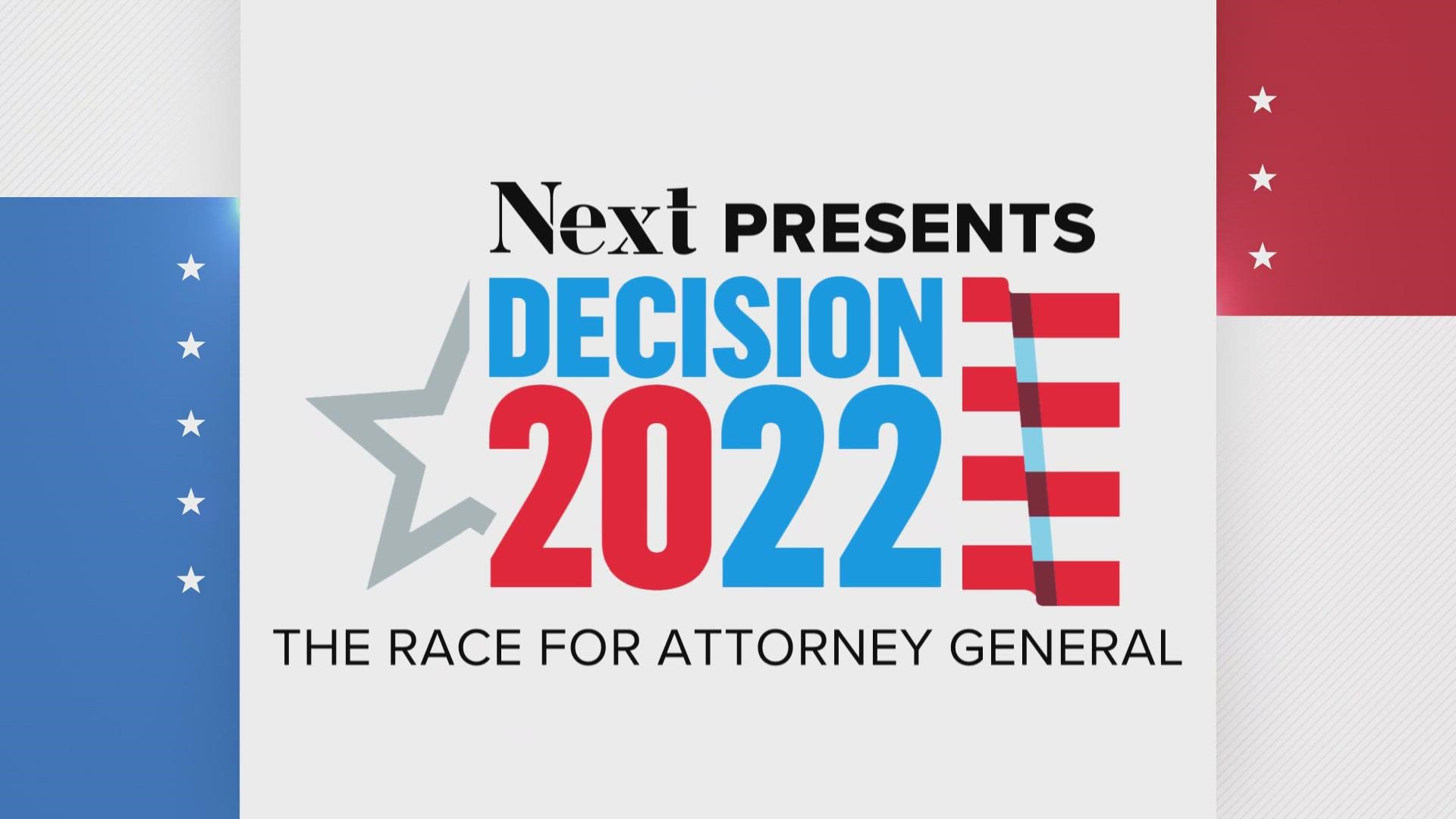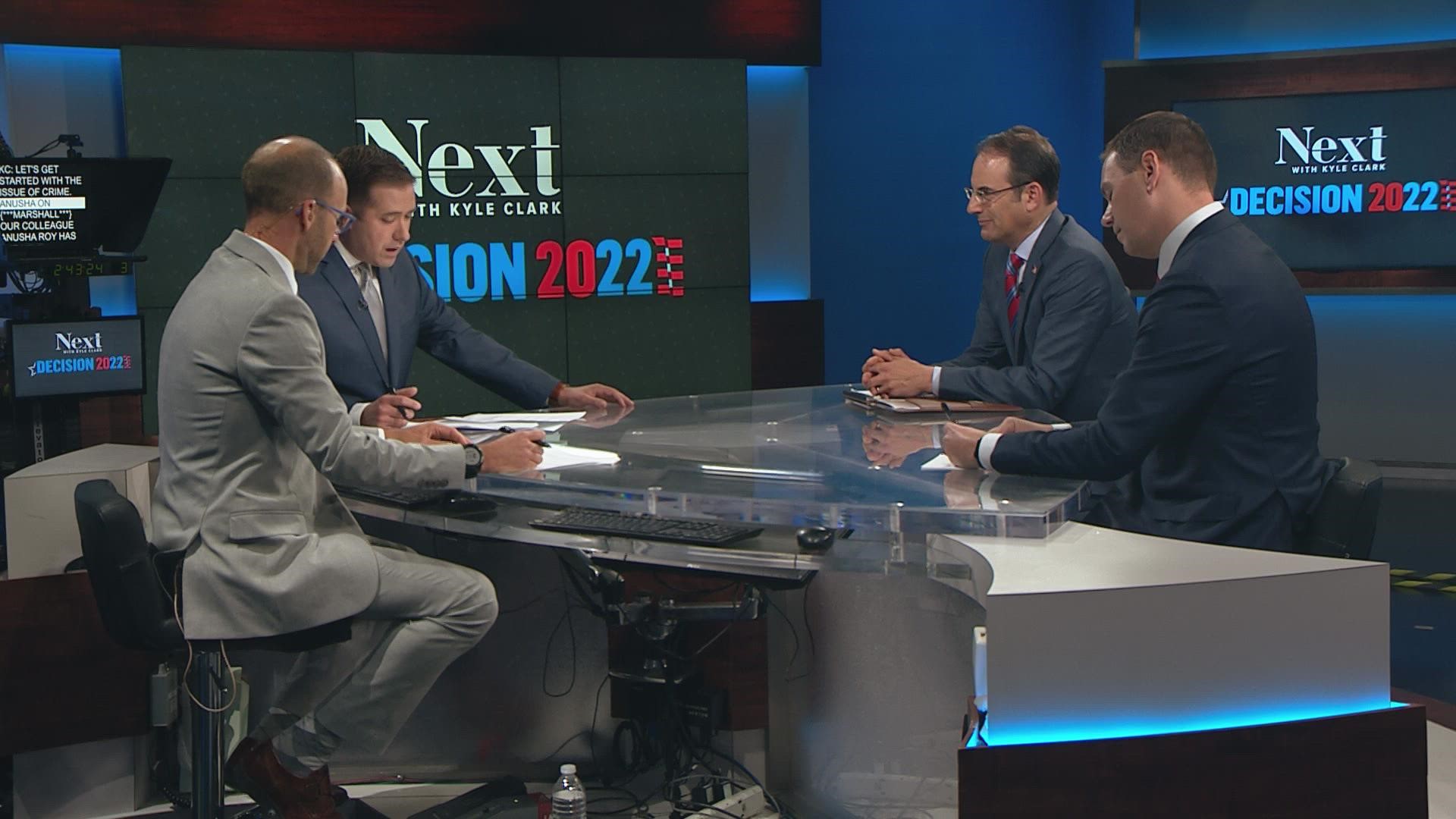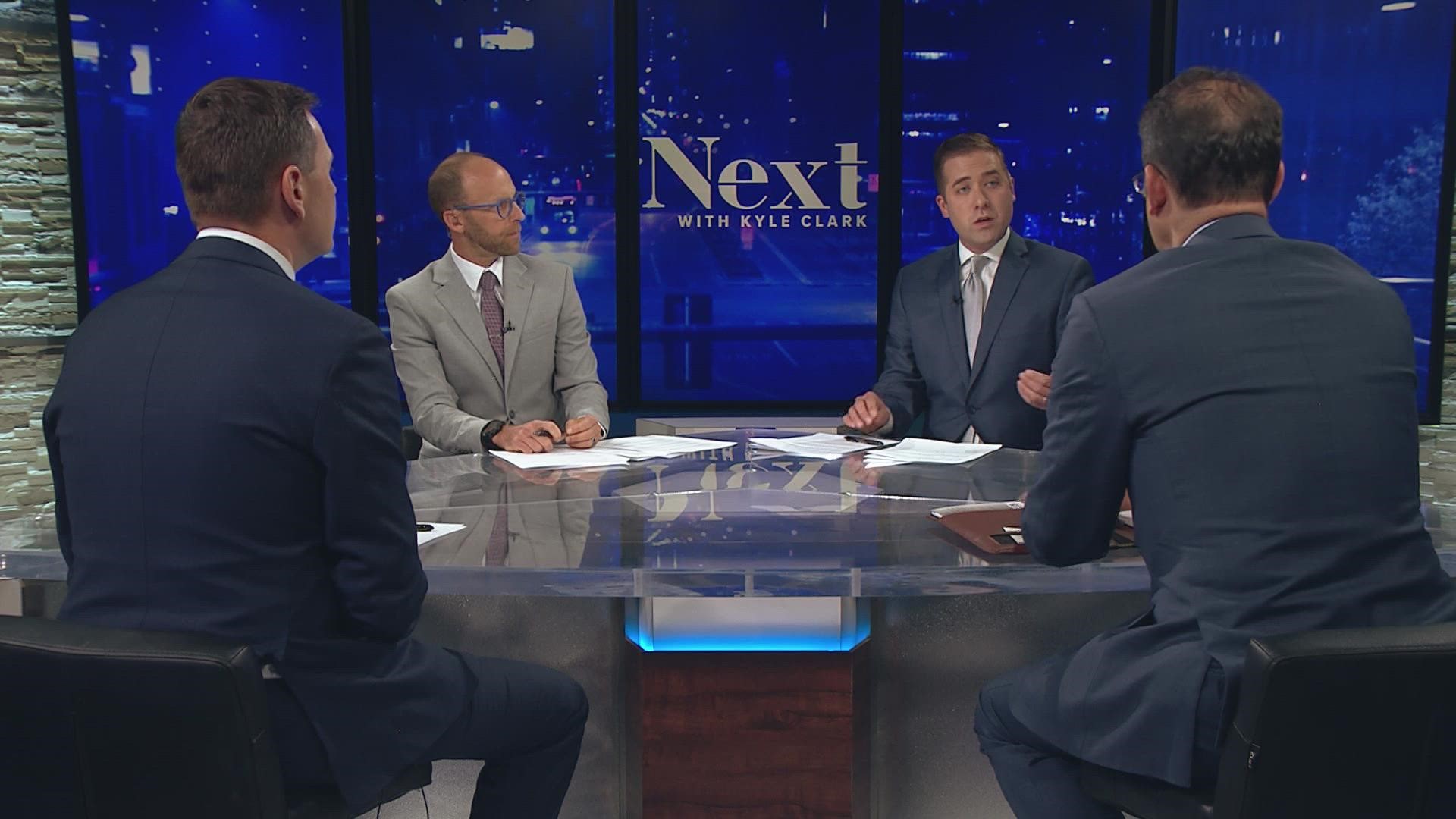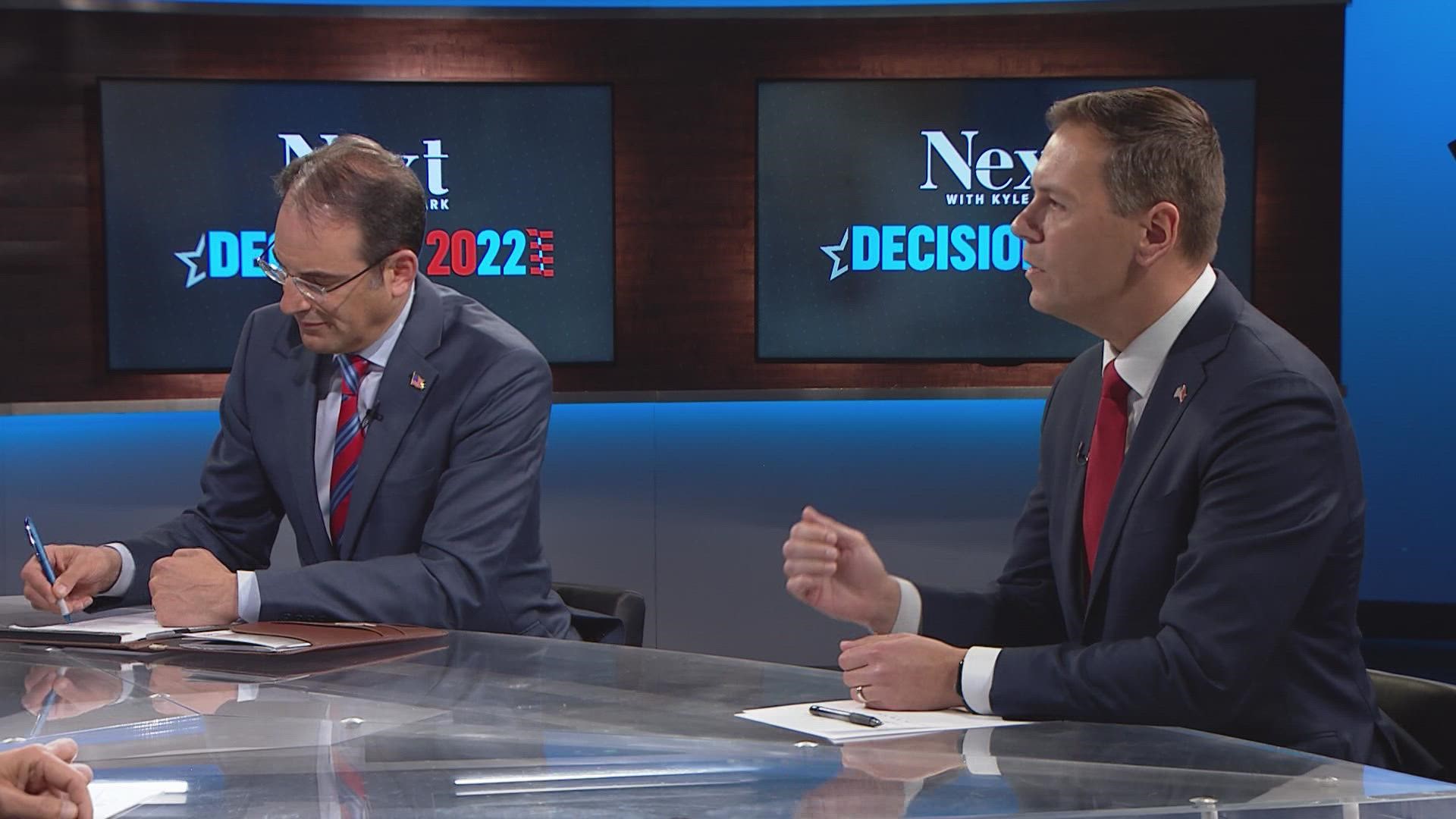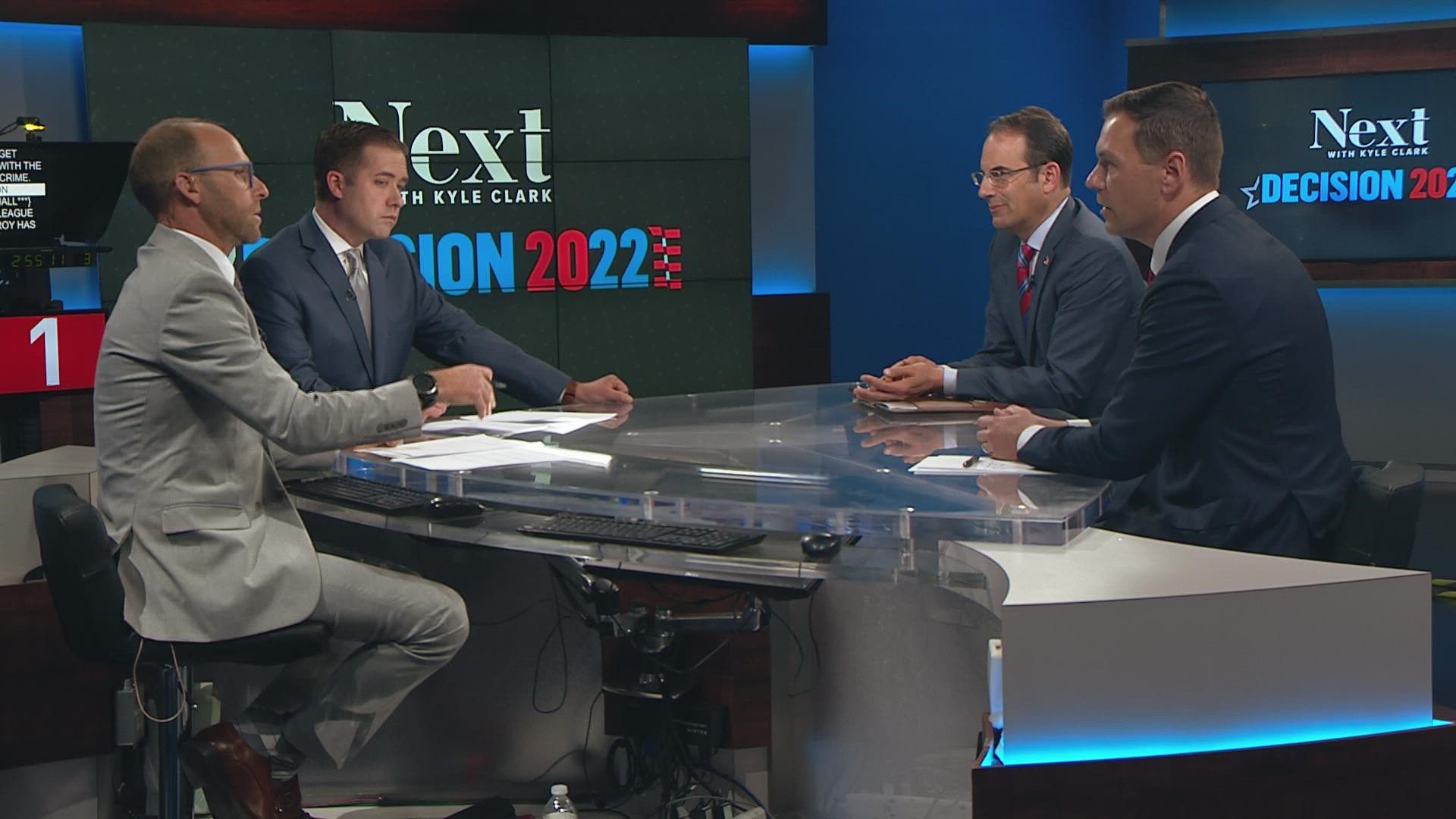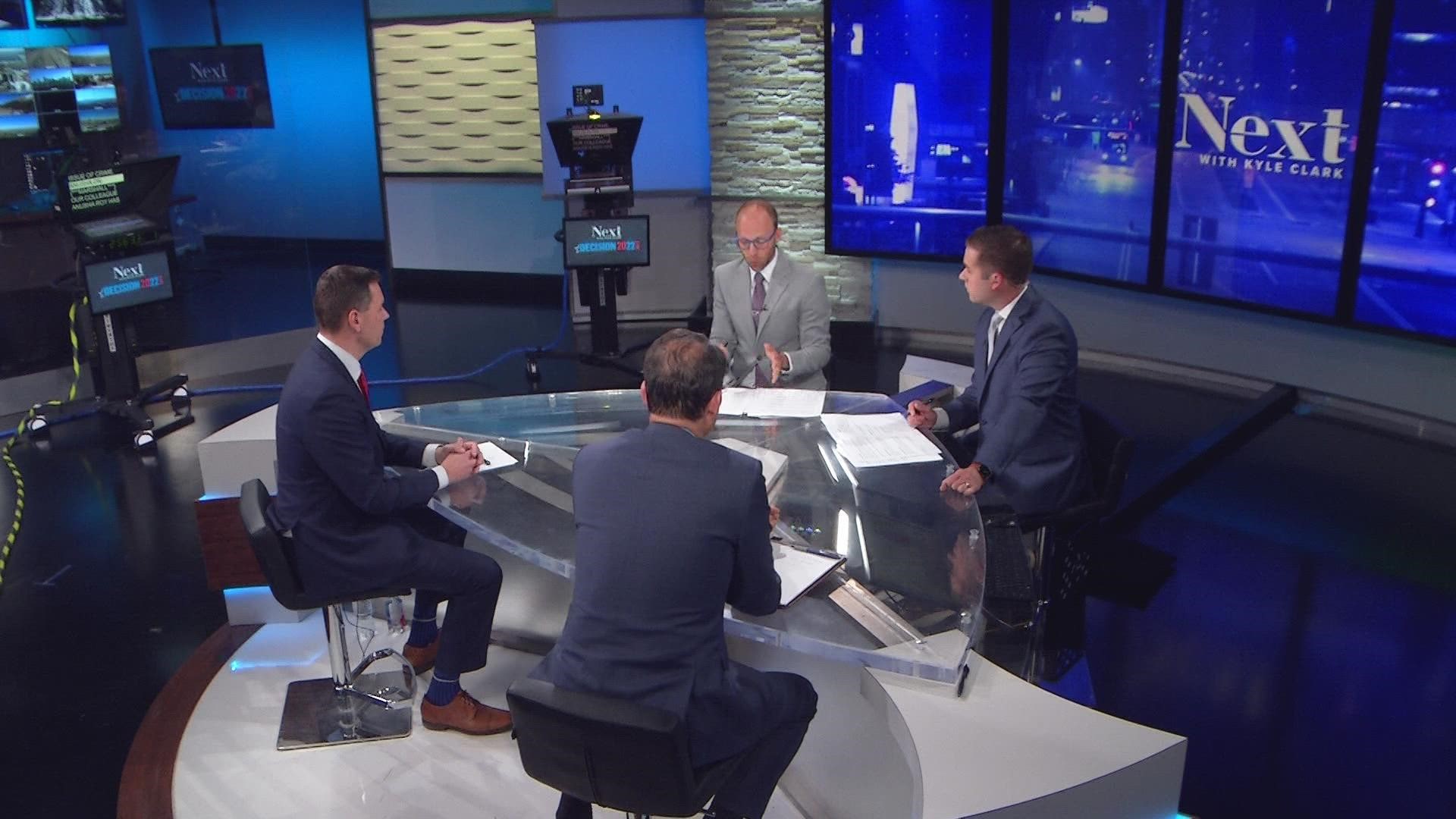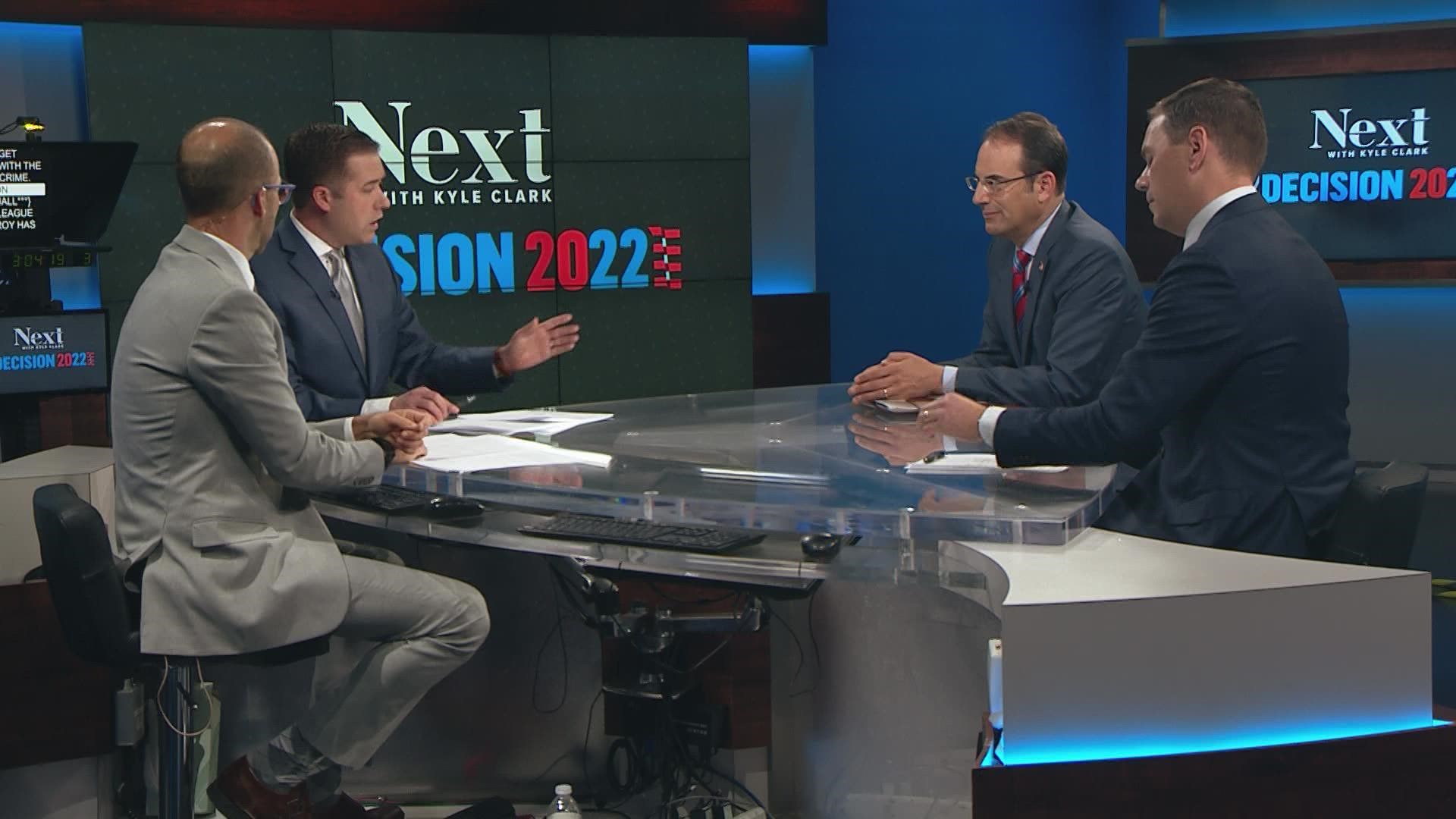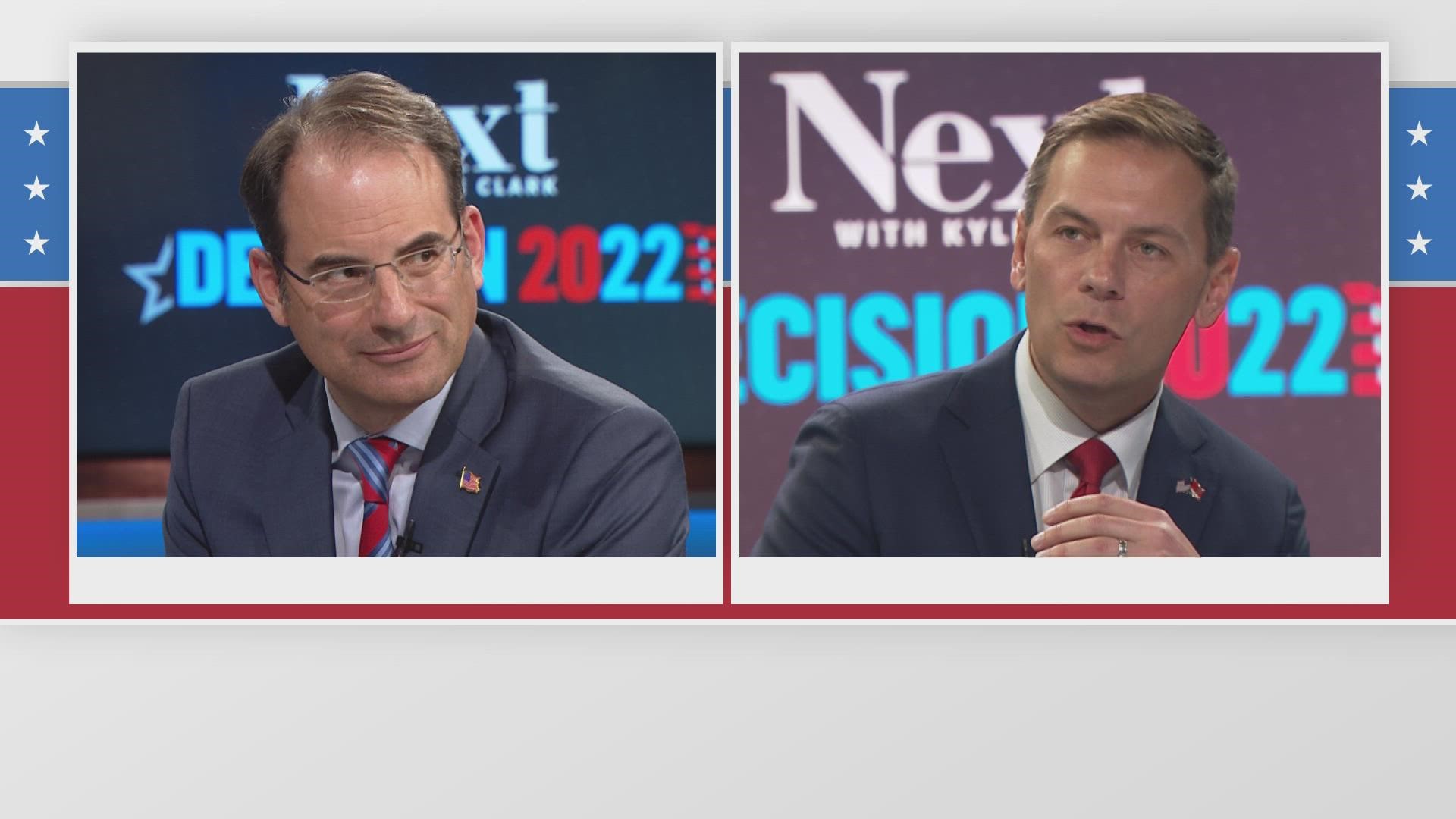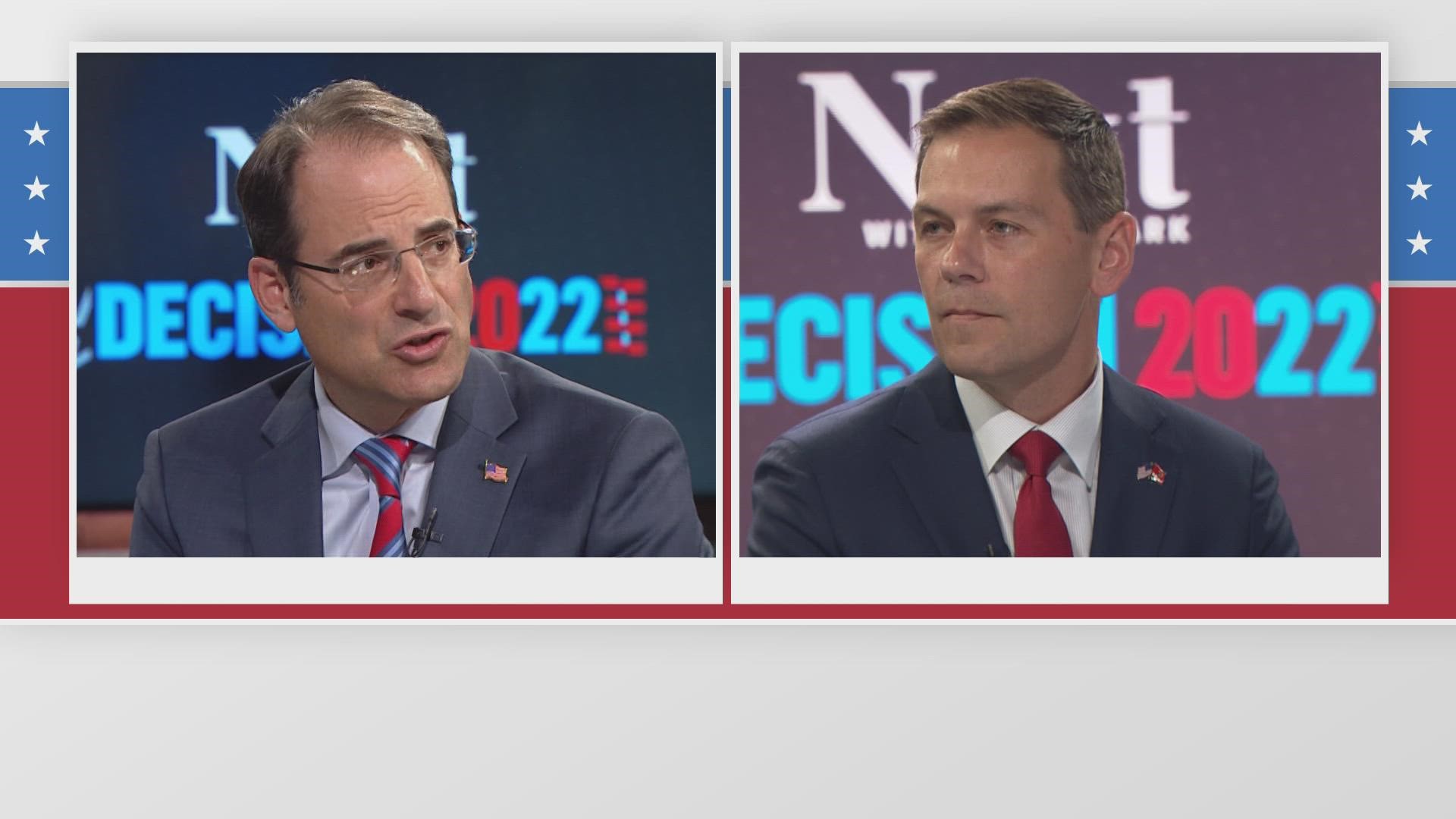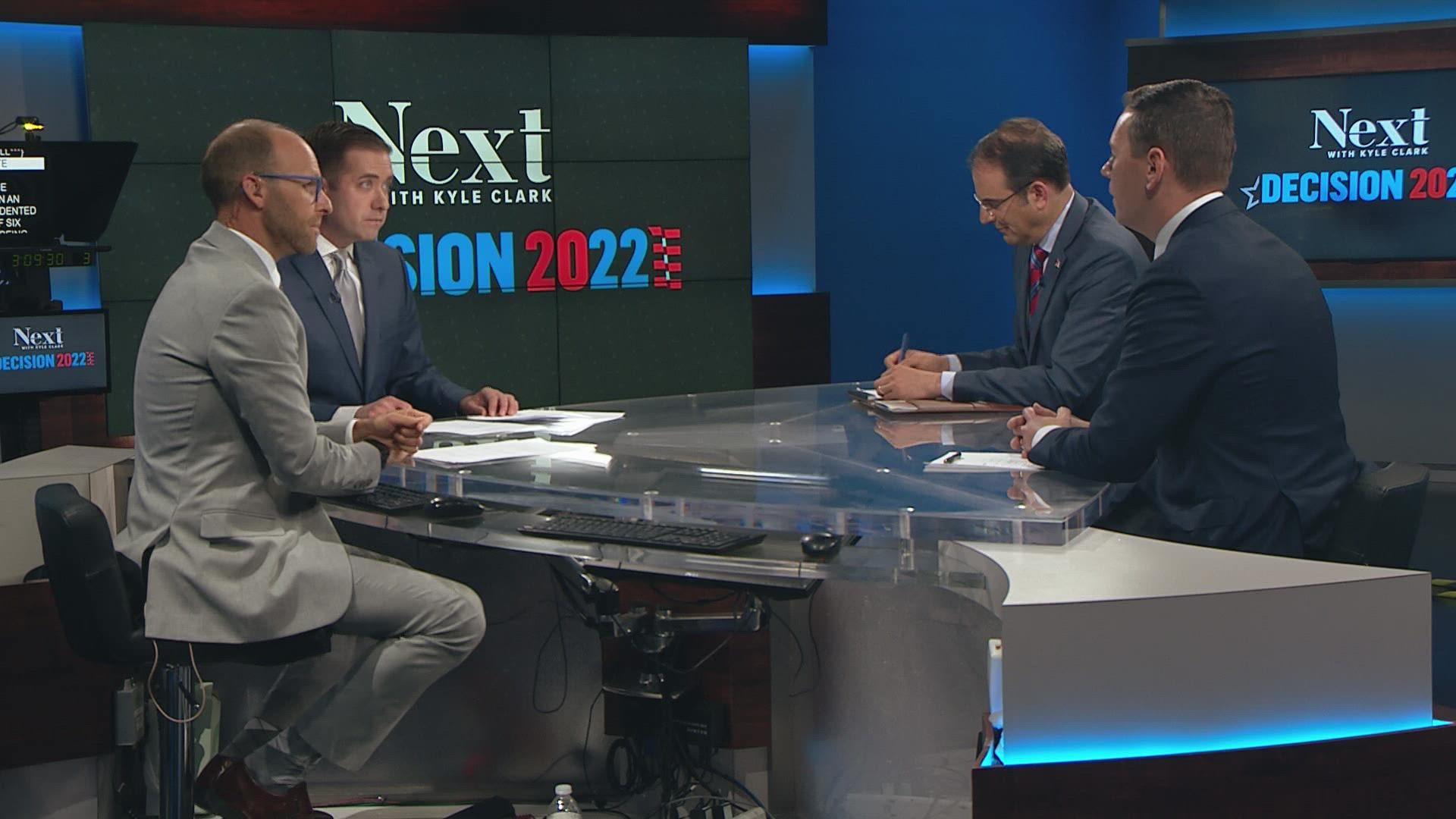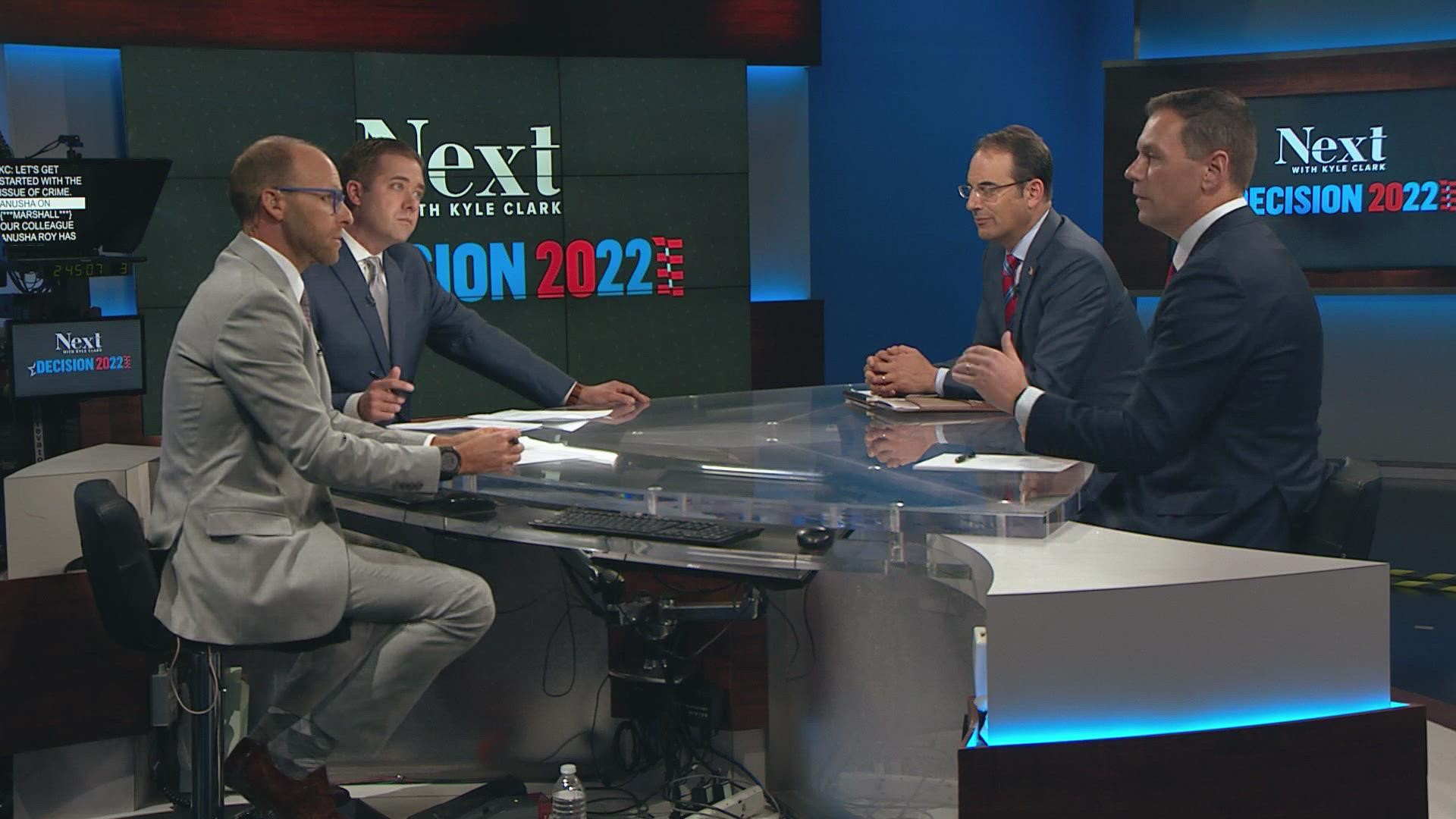COLORADO, USA — Incumbent Democratic Attorney General Phil Weiser faced off against Republican challenger and 18th Judicial District Attorney John Kellner on Tuesday, presented by NEXT on 9NEWS. This was the second in a series of six debates put on by 9NEWS.
> Watch the full debate in the video above.
Both candidates ran unopposed in their primaries.
Weiser was elected to his first four-year term as attorney general in 2018. In Colorado, the attorney general can serve up to two consecutive four-year terms if re-elected.
Kellner was sworn in as the district attorney of the 18th Judicial District, which includes Arapahoe, Douglas, Elbert and Lincoln counties, in January 2021. He defeated Democrat Amy Padden in the race to replace a term-limited George Brauchler.
The candidates focused heavily on rising crime, the fentanyl crisis, and reproductive rights in Colorado, even expressing misgivings about whether their opponent was being genuine in their responses.
Below are questions from moderators Kyle Clark and Marshall Zelinger, and the answers and rebuttals from candidates:
Violent Crime
Q to Weiser: Mr. Weiser, you’ve called yourself Colorado’s “chief law enforcement officer” and even posed with a badge. But you haven’t taken responsibility for rising violent crime in Colorado. How can you have it both ways?
Weiser: “It’s important to distinguish between who is the chief law enforcement officer for the 18th Judicial District and for the state. Everything in Arapahoe County – car thefts, drug dealing, violent crimes – is prosecuted by my opponent. I prosecute state crimes, like Medicare fraud, like organized crime. That is a critical distinction. … I have authority over a range of crimes where I’m the chief law enforcement officer, but my opponent and other DAs deal with another range of violent crimes.”
Q: Do you take any authority for rising crime in Colorado outside of what your office prosecutes?
Weiser: “We have tools that we are using. For example, we train police officers. And we went to the legislature and got millions of dollars for additional funds for recruitment, retaining and mental health for police officers. And we’re building for the first time in four years better police training. We’ve also gone to the legislature on a range of issues, like porch pirate theft, like catalytic converter theft, like fentanyl trafficking, and gotten new tools what are real challenges for Coloradans.”
Q to Kellner: In your four counties, based on data from CBI, crimes against people have climbed while you’ve been DA. Are you responsible for that?
Kellner: “Crime has gone up not only in my district but across the entire state, and that’s really the problem. What you fail to hear from Mr. Weiser is any acceptance of his responsibility as the state’s chief law enforcement official, as someone who should be standing up for the people and advocating for common sense tougher on crime politics that are going to help us on the front lines – prosecutors and law enforcement – actually turn the tide. If you go to those statewide stats and look at the crime rates, for my counties – when you look at car theft, you look at persons crimes and property crimes – they’re actually lower then the entire metro area when you look at it per hundred-thousand people.”
Q for Kellner: How does an attorney general lower the crime rate?
Kellner: “Has to use the bully pulpit. Has to get in front of the legislature and say, ‘Look, what is happening right now is not working for the state of Colorado.’ My opponent advocated for a bill that lowered the penalties for car thieves at a time when we’re No. 1 in the country for car theft. My opponent advocated for a bill that actually allowed convicted felons including car thieves and drug dealers to possess guns again at a time when we’re facing a 25 year high in the violent crime rate.”
Weiser’s response: “My opponent offered some deceptive attacks, not real solutions. That car theft law he talked about updated a law from 1999 that moved the dividing line between felonies and misdemeanors. It just went into effect last spring. That law is not responsible for car thefts. … It was supported bipartisan, overwhelmingly by DAs, and now it’s being cited why we have car theft. … The other example he used is another deceptive attack. Take this question of who has access to weapons. There was this bill, it went through the process, unanimously supported by district attorneys in both parties, overwhelming bipartisan support. It has 60 crimes that it said if you’re having a gun, it’s a felony. I want to add car thieves and drug dealers to that list. But I got 60 out of 62. That’s a pretty good result for a bill. My opponent refused to support that.”
Q for Kellner: You disagreed with other Republicans on that bill. Why do you think you were unable to convince them that you were right on that?
Kellner: “This is a really big challenge because this started in the CCJJ – it’s sort of a place where they bring together stakeholders to come up with bill ideas. I went to the CCJJ and I said, ‘Look, if you’re going to reverse course on this law to keep convicted felons from possessing guns, you’ve got to include the top two public safety Nexis crimes, things like car thieves and drug dealing, when fentanyl is out of control in our state.’ I advocated there and attorney general’s own delegate, the person who voted in the CCJJ, on the record, voted against that path. That stymied our ability, and as I went forward, to the capitol.”
Reproductive Rights
Q to Weiser: Mr. Weiser, you’ve said Coloradans’ rights are at risk if Mr. Kellner is elected. Which rights? And how specifically would Mr. Kellner go about stripping those rights?
Weiser: I have a record of defending the rights of the people of Colorado, from consumer rights to reproductive rights, protecting our land, air and water. My opponent...He doesn't talk about protecting those rights. He doesn't have a track record. We have in my leadership an enviable record of protecting people, of passing the Reproductive Health Equity Act, a law that I will defend...When we look at my opponent's record, we don't have that comfort. My ask is look at our records and judge me based on my record.
Q: But what rights specifically do you think he'd strip away? What rights are at risk and how would the AG go about taking them away?
Weiser: We have as a nation a real challenge right now in a post-Dobbs world. Are we going to have attorneys general advocating for reproductive rights, for the principles of Roe v. Wade? Or advocating for the Dobbs decision, that says states have the right to ban all abortions? Those issues will continue to be in litigation...my opponent says he believes the Dobbs decision is correct. And the consequences from that decision are awful.
Q to Kellner: Mr. Kellner, you said you would defend Colorado’s law providing access to abortion, even though you don’t personally support it. If local jurisdictions in Colorado attempt to put their own restrictions on abortion access, would you sue them to protect abortion access?
Kellner: Yes, I would. When I said that I would support the state law and defend it, I mean that...We have the rule of law for a reason. And I have pledged repeatedly that I would defend the Reproductive Health Equity Act, and it's really fear mongering on the part of my opponent to say that somehow that law is at issue in the attorney general's race.
Q to Weiser: You don't believe that? You think there's something in his record that suggests that he's not being honest? Where's the disconnect?
Weiser: When a candidate says 'I don't believe in reproductive rights'-
Kellner's response: I didn't say that.
Weiser: We have to ask; do we trust that candidate to protect reproductive rights? My opponent was asked, are you pro-choice? It's a simple question, yes or no. I am.
Q to Weiser: It’s possible other states that restrict abortion access will try to prosecute their residents who come to states like Colorado for abortions.
Mr. Weiser, you signed onto a nationwide letter this summer saying you would use discretion and decline to use your office resources to criminalize reproductive health decisions...I need to ask, do you support decisions by local law enforcement and DAs to not enforce laws they disagree with?
Weiser: Local district attorneys are elected saying what they're going to prioritize or not, and they're going to make judgements based on resources. That's the way our system works. I accept that...what I can't do is do the job for district attorneys...what I can do, and what I have done, is work with them.
Opioid Settlement Money
Q to Kellner: It’s been a long road, but counties across the state are now getting money from the opioid settlement. The need will likely outpace the money coming here. What do you think is the best way to spend these funds and where in Colorado?
Kellner: One of the things that I think is really important about this process is that local areas are making those decisions about how to use this funding...That's [allocation] already been predetermined based off of the formula that was agreed upon by the attorney general and the local municipalities as to who's getting how much and over what time horizon.
Q to Weiser: Mr. Weiser, the best way to spend these funds?
Weiser: Is the way we've done it...before even we had the money, I sat down with local leaders all across the state...and we said we need a bottom-up solution. We created 19 regions to spend this money as the regions saw fit and 90% of the money is going to the local level...it's gonna save lives.
Fentanyl Crisis
Q to Weiser: Mr. Weiser – Between 2000 and 2019 – the state recorded 908 fentanyl-related deaths. Last year, there 912. Halfway through this year, 425.
You weighed in to support a pathway to supervised drug injection sites in Pennsylvania. If a local government in Colorado wanted to have supervised drug injection sites - would you support that?
Weiser: I don't support supervised injection sites in Colorado. What I want to make clear is the action in Pennsylvania wasn't because I support those sites, it's because of principle - that states should be allowed to experiment. In Colorado, we have legal and regulated marijuana. At that time, Attorney General Jess Sessions was attacking our system...what I support is state authority to make decisions for themselves...I don't support those sites...I want to make sure that legal principle supports Colorado's ability to have a legal and regulated marijuana market.
Q to Kellner: Mr. Kellner, do you support supervised drug injection sites?
Kellner: No, I don't. And I think we've seen from a lot of the research that we see crime go up around these areas, and unfortunately, they've not been very effective in getting people addiction treatment and actually getting off the substance abuse that's unfortunately ruining many of their lives. But to hear Mr. Weiser claim that he didn't actually support supervised injection sites doesn't make sense based off the record...in Colorado we heard an outcry that said 'no, we don't want that here, we don't want it here in Denver in particular.' And yet he still filed that brief and advanced that position because that is truly what he believes.
Q: Do you think he's being disingenuous on his position right here?
Kellner: I think he's changing his position to fit the mood right now.
Weiser's response: We had a press conference a year ago...and my answer then was the same as it was now. I don't support these sites. What I support is more drug treatment recovery. The $520 million we're getting is going to save lives, but that's not enough money. I support more education and awareness.
Kellner's response: Marhsall, you mentioned over 900 Coloradans who lost their lives alone last year. We're on pace for over 1,500 this year in 2022, and in 2019 when the legislature was debating whether to decriminalize the possession of hard drugs, like heroin, meth, cocaine, and yes, fentanyl, Mr. Weiser, the chief law enforcement officer for this state, failed to go to the capitol and didn't say a word against it.
Q: Halfway through the year, 425 fentanyl related deaths, that's according to the Colorado State Health Department. You just said over 1,500. Do you have any stats the state doesn't have?
Kellner: Absolutely...we know...how backed up the coroner's offices are and the toxicology reports, because of how overwhelmed they are with getting these unfortunate fentanyl overdose or fentanyl poisonings.
Q: Mr. Weiser, I know this year you supported a bipartisan effort to increase the penalties for fentanyl possession. Why did you sit this issue out years ago when it was being debated in the legislature?
Weiser: The earlier discussion in 2018 was a bill that I didn't support. I was focused at that time on the red flag law, making sure to get that passed. The 2019 bill was a bipartisan bill and it's before we'd seen the most recent rise in fentanyl.
Q: You said the reason you didn't weigh in on the fentanyl decriminalization previously or lessoning criminal penalties for fentanyl earlier was because you were focused on the red flag bill. Fair to say you have a pretty large staff, you've got to be able to do more than one thing at once. Do you look back on that as an error?
Weiser: The problem when you look back...is you didn't have the information that we now have. As I got more information, I saw we had to change course, I made sure we did change course, and we did. The earlier bipartisan support for that bill is one that a lot of people will probably say is we didn't realize what was happening...I've heard from Republicans this fear mongering that we're number two in fentanyl deaths. That's not true. We're number 26, which is awful.
Q: I've heard other republicans say that, has your opponent said that?
Kellner's response: No, no. I've said we have the second highest rate of fentanyl overdose increases. That's the correct stat.
Weiser's response: I've not heard him correct other Republicans on this because they've tried to make this about fear mongering. This shouldn't be about fear, this should be about problem solving.
Kellner's response: It's so important to have an attorney general as chief law enforcement officer who can be forward looking. When I hear Phil say that he didn't see this crisis coming in 2019, we had rising deaths in 2018...that's why this year, when I went to the capitol on the Fentanyl Accountability Bill, I was saying look, be forward thinking about the next iteration of synthetic opioids and urge and urge them to expand that bill to make sure we're covering what's coming and not just what's in front of us.
Consumer Protection
Q to Kellner: Mr. Kellner, do you have any concerns about the proposed merger of the parent companies of King Soopers and Safeway? And what’s one specific area of antitrust where you’d apply more scrutiny to protect Coloradans from monopolies?
Kellner: I think as we look around there's no question that we've got one of the highest rates of inflation across the entire country...so any time you see something like this happening where you've got two large companies merging, you've got to be concerned about potentially losing some competition in the marketplace...it's too early to say whether of not this is a good idea, if the attorney general's gonna step in and have some sort of authority over this merger, but it's certainly something to keep an eye on.
Q: Should Coloradans be concerned that you lack experience in this area, being a criminal prosecutor, and your opponent has deep experience here?
Kellner: Just to be really clear, I don't wanna discount the fact that I served 15 years in the Marine Corps as a judge advocate, as a lawyer, and had varied experience across all different levels. One of those things was actually advocating for service members in consumer fraud cases...I come to this with a great of experience, not just my criminal justice experience.
Q to Weiser: Mr. Weiser, concerns about the proposed merger of the parent companies of Kings and Safeway and an area where you would like to see your office be even more aggressive on antitrust?
Weiser: I respect my opponent's experience and I think it's being put to really good use right now as a criminal prosecutor...I have in the past addressed mergers...as for this merger, I do worry for consumers, for workers, and for competitors. I've got long experience enforcing antitrust laws. I'm a nationwide leader on this...I'm concerned about too much consolidation squeezing consumers and I fought for consumers.
Public Safety Special Session
Q from Kellner: You supported a bill that made it a misdemeanor to steal cars of $2,000 or less when it used to be a felony. You supported a bill that made it possible for convicted felons including drug dealers and car thieves to possess guns again. Will you join me in calling upon the governor to call a special session to bring the legislators back to solve some of these public safety crises?
Weiser: “That bill you’re talking about moved the limit from $500, which was set in 1999, up to $2,000. I want to change it, but to say it’s causing car thefts is just being deceptive to people. … I’ve also talked about the bill on firearms, got 60 of them … I couldn’t get the final two. We’re working on those. We can work the right way together, honestly, to solve problems. These deceptive attacks, they’re not helpful and they’re not how we do business in Colorado.”
Q: So that’s a no on special session?
Weiser: “We’re going to get to this in the next session. We don’t need to play a political game and have a special session.”
NRA Questionnaire
Question from Weiser: You filled out a survey that made certain commitments to the National Rifle Association that got you an A rating. They rated me an F because they know I’m a gun-safety champion. Will you release that questionnaire telling the voters what commitments you made to the NRA?
Kellner: “The reason why the NRA supports me is because I am someone who’s been involved in shooting sports my entire life. Grew up skeet shooting and hunting. I’m a Marine and a Republican. I’m not surprised the NRA would support me. What you’re missing here is that I am supported by the NRA because I want to keep guns out of the hands of dangerous people who want to harm themselves or others and dangerous criminals.”
Weiser: Will you not release the questionnaire?
Kellner: “You know exactly what that questionnaire is about.”
Weiser: “I don’t. I don’t know what’s in it. … I didn’t fill out an NRA questionnaire.”
Kellner: “Is that why you have an F, then?”
Future Office
Q to Kellner: Two quick answers to quick questions, please. Mr. Kellner, you ran for District Attorney in 2020 and your term runs through 2024. Now you’re trying to leave that job for attorney general. If you really don’t want to be DA anymore, why haven’t you resigned?
Kellner: This is so important to me, because I did not run for district attorney with the idea that I would run for attorney general. But as I looked around at the statewide problem with crime, and I see it impacting people in my community, I knew I had to do something...I feel like every single day that I'm fighting for public safety in the state, running for this office, I'm also fighting for safety and wellbeing of the people in my district.
Q: So, it's a fallback in case you don't win?
Kellner: I don't know about that. I'm certainly going to continue on as district attorney, I do love that job.
Q to Weiser: Mr. Weiser, I know you’re running for attorney general. Simple yes or no, do you want to be governor?
Weiser: I want to be attorney general. This is a dream job for me. It's a chance to use the law to serve...this is my dream job, that's not my dream.
Closing Statements
Recap and Fact Check
9NEWS political debates
9NEWS is hosting six candidate debates ahead of the 2022 general election on Nov. 8. The full slate includes four statewide races and the two most competitive congressional races.
All of the debates will be livestreamed on 9NEWS.com, 9NEWS+ and the 9NEWS YouTube channel and will be available to watch afterward on those platforms.
The full lineup of debates is below:
- Thursday, Oct. 13, live at 6:30 p.m. – 8th Congressional District – state Sen. Yadira Caraveo (D) and state Sen. Barbara Kirkmeyer (R) .
- Tuesday, Oct. 18, during Next with Kyle Clark at 6 p.m., full debate online – attorney general – John Kellner (R), district attorney for the 18th Judicial District, and incumbent Phil Weiser (D).
- Wednesday, Oct. 19, during Next with Kyle Clark at 6 p.m., full debate online – state treasurer – former state Rep. Lang Sias (R) and incumbent Dave Young (D).
- Friday, Oct. 21, during Next with Kyle Clark at 6 p.m., full debate online – 7th Congressional District – state Sen. Brittany Pettersen (D) and Erik Aadland (R).
- Monday, Oct. 24, during Next with Kyle Clark at 6 p.m., full debate online – secretary of state – Pam Anderson (R), former two-term Jefferson County clerk, and incumbent Jena Griswold (D).
- Friday, Oct. 28, live at 7 p.m. – U.S. Senate – Sen. Michael Bennet (D) and business owner Joe O’Dea (R).
SUGGESTED VIDEOS: Election 2022

